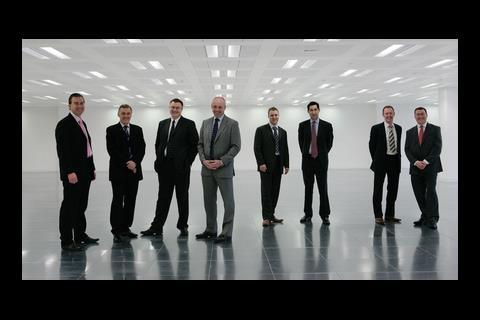8build was formed by senior managers at ISG who spent years observing the follies and failings of the traditional industry â and set out to solve them with their own company.
Katie Puckett finds out more about their thinking
There canât be many wage slaves who havenât dreamed of setting up their own business, even if itâs only for a wistful five minutes on a wet Monday morning.
The founders of fit-out contractor 8build are among the few who have actually gone and done it. In September 2005, Nigel Bellamy, Steve Oakford and Mick Mannion started out with a borrowed office in the City and an ambition to do things a bit differently.
Now in their third year, they have already smashed their five-year turnover target of ÂŁ25m by ÂŁ7m and were voted entrepreneurs of the year at the șĂÉ«ÏÈÉúTV awards in May. They are on site at a ÂŁ10m office fit-out for British Land at 338 Euston Road, their biggest job so far, and have just secured a ÂŁ40m fit-out for a company in Canary Wharf.
The secret to their success is a mix of worldly experience, industry contacts, and a well-honed strategy based on the principles of Egan and Latham; but its origins lie in general disgruntlement. Bellamy and Oakford reckon they spent about four years talking about all the things that irritated them about the construction industry, and then a year thrashing out a business plan that would set them to rights.
âWe just added up all the frustrations we experienced, analysed each one, thought how it could be done better and worked it into a philosophy from there,â says Bellamy, the shorter and more understated of the two.
âIt was a risk. We were highly paid people in senior positions; we could have kept in that comfort zone and had a nice life. Or we could have done something different.â
If theyâd waited three months longer they would have been due âbig bonusesâ from their employer. Why not hang on? âIf you do that, then you end up sticking around for your Christmas bonus and it goes on,â says Bellamy. âIf you're going to do it, youâve got to do it. It shouldnât be about money.â
Instead, they mortgaged their houses and worked for a year without pay to fund the entire thing themselves.
Constructing the team
We wanted to work with nice people ⊠they know us with all our faults and we all cover each other.
Of course, the fact that they were highly paid people in senior positions meant they were well connected. In 1989, Bellamy and Oakford were part of the team that set up Stanhopeâs fit-out business, which later became ISG InteriorExterior, and they spent 16 years building it up from nothing to 500 staff. They regularly worked with fellow founder Mannion in his role as client representative for British Land, the blue-chip developer that gave 8build its first job.
âI think it was a great help that they knew us so well,â says Oakford. âMick used to be their rep and we were the team who delivered it, so as far as they were concerned it was: carry on, we trust you.â
The three founders set about attracting an experienced management team, used to heading much larger projects than any the firm has secured so far. This was a deliberate â if expensive â strategy to gain immediate credibility. There are eight directors, including Bellamy and Oakford, all of whom have worked together for many years. The directors were attracted partly by the
no-hassle philosophy, and partly by substantial equity stakes in the firm. âYou need a strategy to attract the best people,â says Oakford. âIf you try to do it with salary packages, itâs a tough marketplace.â
âWeâre not greedy, weâre trying to give something back,â adds Bellamy. âMany companies are founded by one or two guys who hold on to everything as long as they possibly can. Weâve done the complete opposite of that. The guys have come in
with shares, theyâre personally motivated, itâs their business as well as ours. âHiring experienced staff wasnât the only significant initial outlay. âThe days of two guys starting up without an awful lot of back-up and systems and procedures in place are long gone,â says Oakford. âYou have to demonstrate high levels of competence as a business from day one. In the modern construction industry, you have to have an awful lot of accreditation to be a contractor.â
8buildâs list of credentials include the ISO 9001 quality management standard, CHAS for health and safety and the government's Constructionline prequalification scheme. âWhen youâre tendering, thereâs always a question about whether you have ISO 9001, and you have to be able to say you have.â
Putting a plan into action
8build sum up their big idea as âlean constructionâ. With its central ethos of partnering, reducing risk and therefore paperwork, this draws on the Latham and Egan reports in the nineties. However, 8build had the advantage of a completely clean slate to put it into action.
We added up all the frustrations we experienced, analysed each one and thought how it could be done better
Nigel Bellamy, 8build co-founder
8build will do things the traditional way if the client wants, or allow it to choose just some elements of lean construction. Oakford says every client has used some aspects.
The âleanestâ example to date has been a ÂŁ7.5m job in Victoria for a FTSE 100 energy company, fitting out its head office and dealing facilities. Bellamy says most of the items on their list were taken up: a slimmed down management team, partnering agreements with subcontractors, fortnightly payments and no retention, no onerous contract conditions, just a standard JCT. On certain items, such as services, the clientâs design team has negotiated with the suppliers and 8build has reduced its mark-up to recognise the work theyâve done. As an example of how much money can be saved, one subcontractor has reduced its prelims and mark-up from 15% to 12.5%.
To keep overheads down, 8build employs no estimators, so all the pricing is done by financial management surveyors who stay with the project throughout. There are no project planners either â 8build has invested in software so can produce all the programmes. Tender pricing is meticulous â subbies are chased for details so they can begin as soon as the job is won without going back to the market. âWe price the final account at tender stage, so if someone hasnât done as comprehensive a job their price may be lower,â concedes Bellamy. âThereâs always that danger but weâve got a philosophy to maintain.â
Another part of the philosophy is 8buildâs social conscience. It has gone carbon neutral, it is part of the Inspire scheme in Hackney which gives work experience to children who are interested in construction, and it takes at least two graduates a year on its training scheme. Itâs also about to start on a ÂŁ151,000 not-for-profit project for the Salvation Army.
8buildâs founders donât know where the future will take them. They had had enough of working for shareholdersâ targets and are enjoying the freedom of being their own bosses. âNo matter how much science you try to apply, if you follow the opportunities as they come up it takes you where itâs going to take you,â says Oakford.
Bellamy says theyâve turned down work rather than risk disappointing a client. âThe honest approach wins through in the end. We have no borrowings, no other company that has an interest, no overdrafts, weâre cash positive and weâre already trading profitably. We have no shareholder to satisfy, or banks that have to be repaid every month. Weâre our own masters really. We donât need to scattergun the industry.â
âWe wanted to have a bit more fun; we thought the old way of working was very staid,â says Bellamy. âWe wanted to work with nice people and weâve got a nice team ethos going â all the people here are very experienced, they know us with all our faults and we all cover each other.â
Oakford continues: âYou reach that stage in life when you say, âif weâre going to do something, now is the time to do itâ; you either do it or you donât. I didnât want to get to the end of my career and look back and say, âWhat if weâd given that a go âŠââ





























No comments yet